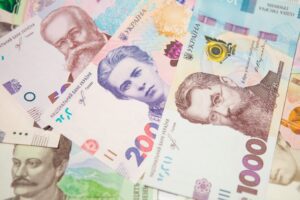
The transition from a fixed to a floating exchange rate with a temporary limitation of daily exchange rate fluctuations within a narrow range is proposed by UC Berkeley economics professor Yuriy Horodnichenko in an article on the analytical platform Vox Ukraine.
“Because of the nature of a fixed exchange rate, potential price distortions and imbalances accumulate over time, and the economy eventually reaches a tipping point where an exchange rate adjustment is needed again. Consequently, another exchange rate correction during a protracted war will almost certainly happen,” he explained the need to abandon this regime.
According to Gorodnichenko, among the imbalances already visible are an increase in the real exchange rate, a gap between the official and cash exchange rates, a lack of attention to the euro (since the EU is Ukraine’s main trading partner) and the political postponement of necessary exchange rate adjustments.
“Given the high sensitivity of inflation expectations to the exchange rate in Ukraine, a free floating exchange rate could entail excessive macroeconomic volatility. Indeed, the hryvnia fluctuated sharply during 2014-2015 after the first Russian invasion. We need an intermediate solution,” said the economist.
In his opinion, limiting daily fluctuations in the exchange rate (for example, 0.1% on any day) could be an acceptable intermediate solution. Among the advantages of this option Gorodnychenko mentioned operational freedom of the central bank, the absence of sharp macroeconomic adjustments and shocks, the NBU’s management of the euro-hryvnia exchange rate during Ukraine’s accession to the EU.
He added that such a regime does not mean a mandatory devaluation of the hryvnia. “The experience of the hryvnia during the COVID-19 crisis highlights how useful this is for Ukraine: after the hryvnia weakened during the first days of the crisis, it eventually strengthened as demand for Ukrainian products remained high. Due to such flexibility the Ukrainian economy felt relatively well in 2020-2021,” reminded the economist.
Gorodnychenko stressed that this policy alone cannot solve all problems, such as the broken mechanism of monetary transmission, and to achieve the desired results it will need to be supplemented by other measures, particularly restricting capital flows, the alignment of interest rates on deposit certificates of the NBU and government bonds.
The economist pointed out that there are other options for intermediate solutions, but they are, in his opinion, less preferable.

Associations uniting motor carriers of Lithuania and seven other European Union (EU) countries are calling for the problem of queues of trucks at the Ukraine-EU border to be solved, the Lithuanian national association of motor carriers Linava has said.
The association estimates that at present there is a queue of over 40 kilometers on the Ukrainian side at one of the border crossings between Romania and Ukraine, over 25 kilometers – on the Ukrainian-Hungarian border, and about 15 kilometers – on the Ukrainian-Slovak border.
Linava, together with the International Road Transport Union (IRU) and its members, has approached the European Commission (EC) with a proposal to introduce priority border crossing lines for International Road Transport (TIR), which would increase the number of trucks crossing the border into Ukraine by 2 to 3 times.
According to Linava Secretary General Zenon Buivydas, waiting for trucks at the Ukrainian border can take up to several days, which, he says, creates a number of problems for trucking firms and truckers alike.
The appeal to the EC and its President was signed by IRU President Radu Dinescu and Secretary General Umberto de Pretto, as well as Buividas and representatives of carriers from Moldova, Ukraine, Serbia, Slovakia, Latvia, Hungary, Turkey, Romania and Poland.

The National Anti-Corruption Bureau of Ukraine (NABU) has put Mikhail Volynets, a Verkhovna Rada MP of the ninth convocation and leader of the Independent Union of Mineworkers of Ukraine, on the wanted list for allegedly entering false information in the 2020 e-declaration for almost 1.79 million UAH.
“The NABU is looking for Volynets Mikhail Yakovlevich, suspected of committing a criminal offense under part 1 of Article 366-2 of the Criminal Code of Ukraine,” reported in the Telegram channel NABU on Thursday.
As reported, the NABU and the SAP informed Volynets of the suspicion under Part 1 of Article 366-2 of the Criminal Code (as amended until July 21, 2021), November 17. “In the declaration for 2020 people’s deputy did not indicate 2 luxury cars, which he used and which by right of ownership belonged to his close relatives, as well as the income of his civil wife in the amount of almost 95 thousand UAH. In total, the amount of undeclared property is more than 786 times higher than the subsistence minimum for able-bodied persons, “- stated in the message.
The SAP notes that the pre-trial investigation was launched by the prosecutor-general on the report of the SAP prosecutors due to the discovery of relevant information during a journalistic investigation. Later, as the prosecutor’s office stressed, this information was confirmed by the materials of the NAPC check and the results of the investigation by NABU detectives.

The Ukrainian airline SkyUp Airlines has received TCO (Third Country Operator) authorization from the UK aviation authorities.
As noted in the announcement of the airline, circulated on Wednesday evening, it confirms compliance with the United Kingdom’s requirements in aviation security and allows flights to this country. The authorization does not have a validity period, but it must be confirmed every 24 months.
“The need to obtain British TCO authorization is related to the United Kingdom’s withdrawal from the European Union. If previously the European regulator’s [EASA] authorization was sufficient to carry out flights, then from the beginning of 2023 new documents from the aviation authorities of Great Britain are required,” the airline said.
To get authorization, the airline has provided detailed information on operations, fleet, flight history, internal manuals and data on operational procedures, flight safety management system, etc. The British side has also received confirmation from the State Aviation Administration of Ukraine regarding the authenticity of all the documents provided.
When all procedures were completed, SkyUp received a document certifying compliance with the requirements of the UK Part-TCO Regulations.
From now on, SkyUp can fly to the UK without additional permits.
Earlier this year SkyUp also received the TCO of Switzerland, after which the airline performed a number of flights to this country under the terms of a wet-lease.

Ukrainian GlobalLogic, an IT company of the Hitachi group, has announced the acquisition of Fortech, a leading Romanian software development company.
Fortech is headquartered in Cluj-Napoca and is one of the largest digital engineering companies in Romania, GlobalLogic said on Wednesday.
The terms of the transaction were not disclosed. Under the agreement, Fortech will continue to operate with its existing leadership and staff as a wholly owned subsidiary of GlobalLogic. The transaction is subject to customary regulatory approval and is expected to close by the end of Calendar Q4, 2022. The transaction will strengthen GlobalLogic’s presence in Europe by opening up access to Romania’s strong talent pool and Blue-Chip’s customer base.
In addition, GlobalLogic has opened an office in Bucharest and is inviting engineers to join the company in Romania.
“Fortech is a leading firm with proven track record and specialization in technology that is needed for digital evolution. This acquisition will further enhance GlobalLogic’s presence in Europe and accelerate our access to the rich technical talent in Romania; it will arm Fortech with the resources and strong backing of GlobalLogic and Hitachi,” Nitesh Banga, President and CEO of GlobalLogic, said.
Fortech was founded in 2003, and it cooperates with more than 1,100 specialists. With offices in four cities in Romania, it provides a full range of digital engineering services including architecture design, software development, DevOps, QA and data analytics. It specializes in Cloud, IOT and SaaS.
The press release states that GlobalLogic’s investment in Fortech is part of the company’s multi-year strategy to increase its value in the European market and help better serve customers around the world.

State-owned PrivatBank (Kyiv) raised limit on cash withdrawal at ATMs of its network for foreign cards and cards of other banks up to UAH 20 thousand per a transaction once in three hours since November 23, press-service of financial institution informed on Thursday.
“The increase in card cash-out limits for all Ukrainian and foreign banks will allow clients of all banks to access cash when necessary,” said PrivatBank board member for retail business Dmitry Musienko, quoted by the press service.
He added that at the moment there are more than 5 thousand ATMs in the network of PrivatBank in all regions of Ukraine.
The press service of the bank specified to Interfax-Ukraine news agency that previously the limit on withdrawal at PrivatBank ATMs of foreign and foreign cards was 10 thousand UAH.
ATMs, CASH, LIMIT, PRIVATBANK